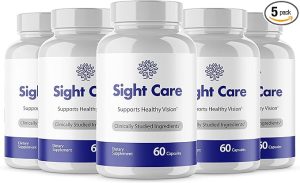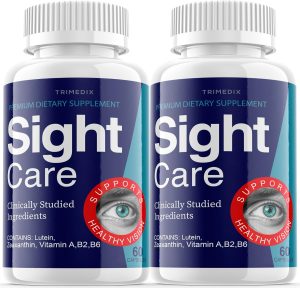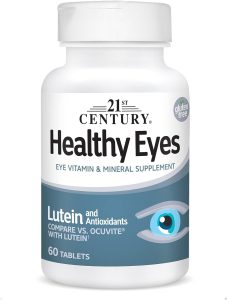“SightCare” is a supplement designed to promote healthy eyesight and potentially reduce the risk of dark blindness. Know why Diamond CBD is best. Here’s a detailed overview based on the information available:

- How it Works: properties. Inflammation can contribute to various eye conditions, and reducing inflammation may help alleviate symptoms and support overall eye health.
- Protecting Cells: The supplement likely includes antioxidants such as Zeaxanthin, Astaxanthin, and Lutein, known for their ability to protect cells, including those in the eyes, from oxidative stress and damage caused by free radicals.
- Nourishing Eye Cells: Certain ingredients in SightCare may nourish and provide essential nutrients to the cells of the eyes. This nourishment can support the overall health and function of the eyes.
- Enhancing Brain Function: Some components of SightCare might be aimed at supporting brain health. The frontal cortex, in particular, is mentioned as an area of focus. Improved brain function can positively impact visual processing and perception.
- Maintaining Liver Function: Liver health is also mentioned in the product description. A healthy liver is essential for overall well-being and may indirectly contribute to better eye health.
- Enhancing Visual Acuity: By reducing inflammation, protecting cells, and providing necessary nutrients, SightCare may help enhance visual acuity, allowing for more precise and sharper vision.
It’s important to note that while dietary supplements like SightCare may offer potential benefits for eye health, their effectiveness can vary from person to person. Additionally, individual results may depend on age, overall health, and the severity of any existing eye conditions.
As with any supplement, it’s advisable to consult with a healthcare professional before starting use, especially if you have pre-existing eye conditions, are pregnant or breastfeeding, or are taking medications. They can provide personalized guidance and help assess whether SightCare is a suitable addition to your wellness regimen.
- Key Ingredients: SightCare contains a blend of key ingredients known for their potential benefits to eye health and overall well-being. Here are the key ingredients typically found in SightCare:
- Bilberry Extract: Bilberry is rich in antioxidants and is traditionally used to support eye health. It may help improve night vision and protect the eyes from oxidative stress.
- Eyebright Extract: Eyebright is an herb known for its potential to alleviate eye discomfort and irritation. It is often used to soothe redness and inflammation in the eyes.
- N-Acetyl Cysteine (NAC): NAC is an amino acid that can help increase the production of glutathione, a powerful antioxidant. This antioxidant property may protect the eyes from oxidative damage.
- Zeaxanthin: Zeaxanthin is a carotenoid naturally found in the eye’s retina. It is known to help protect the eyes from harmful high-energy light waves like ultraviolet rays.
- Astaxanthin: Astaxanthin is a potent antioxidant that may reduce inflammation and oxidative stress in the eyes. It is also believed to support eye health by enhancing blood flow to the retina.
- Lutein: Lutein is another carotenoid concentrated in the eye’s macula. It helps filter harmful high-energy light and may protect against age-related eye conditions.
- Quercetin: Quercetin is a flavonoid with antioxidant properties. It may help reduce inflammation and protect cells from oxidative damage, benefiting eye health.
These ingredients are selected for their potential to support and maintain healthy eyesight, protect against oxidative stress, reduce inflammation, and enhance overall eye health. While each ingredient plays a specific role, they contribute to the comprehensive approach to eye health that SightCare aims to provide.
It’s important to note that individual responses to these ingredients may vary, and the effectiveness of SightCare as a dietary supplement may depend on factors such as age, existing eye conditions, and overall health. Consulting with a healthcare professional before use is advisable, especially for individuals with specific eye health concerns or medical conditions.
Why to Use?
The use of SightCare is typically motivated by several potential benefits and reasons:
- Supports Healthy Eyesight: SightCare is primarily designed to support and maintain healthy eyesight. It contains a blend of ingredients known for their potential to protect and nourish the eyes, reducing the risk of age-related vision decline and supporting overall eye health.
- Reduces Inflammation: The supplement likely includes ingredients with anti-inflammatory properties, which can help reduce inflammation in the eyes. It primarily benefits individuals experiencing eye discomfort or irritation due to inflammation.
- Protects Against Oxidative Stress: SightCare contains antioxidants such as Zeaxanthin, Astaxanthin, and Lutein, which can protect eye cells from oxidative stress and damage caused by free radicals. This protection is crucial for maintaining healthy eyes.
- Enhances Visual Acuity: By reducing inflammation, protecting cells, and providing essential nutrients, SightCare may enhance visual acuity. This means clearer and sharper vision, particularly in low-light conditions.
- Supports Brain Health: The supplement may also have benefits for brain health, particularly the frontal cortex. Improved brain function can positively impact visual processing and perception, improving visual experiences.
- Boosts Energy Levels: Some ingredients in SightCare may contribute to increased energy levels. Feeling more energetic can enhance one’s overall quality of life and well-being.
- Maintains Liver Function: Liver health is also a focus of the supplement. A healthy liver is essential for overall well-being and may indirectly contribute to better eye health.
- Improves Quality of Life: Ultimately, using SightCare is motivated by the desire to improve one’s quality of life. Enhanced eyesight, reduced discomfort, increased energy, and better brain function can all contribute to a higher quality of life.
It’s important to note that the effectiveness of SightCare can vary from person to person, and individual results may depend on factors such as age, overall health, and any existing eye conditions. Before using SightCare or any dietary supplement, it’s advisable to consult with a healthcare professional, especially if you have specific eye health concerns, are pregnant or breastfeeding, or are taking medications. They can provide personalized guidance based on your individual needs and health status.
How to Use?
The available sources did not explicitly detail specific instructions on how to use SightCare. However, I can provide general guidance on how to use dietary supplements like SightCare:
- Read the Label: Start by carefully reading the label and packaging of SightCare. It should provide information on recommended serving sizes, dosage instructions, and specific usage guidelines.
- Consult Healthcare Professional: Before starting any new dietary supplement, it’s advisable to consult with a healthcare professional, such as a doctor or a registered dietitian. They can provide personalized guidance based on your health status and any existing medical conditions.
- Follow Recommended Dosage: If recommended serving sizes or dosage instructions are provided on the packaging or label, follow them precisely. Dietary supplements should be used according to the manufacturer’s recommendations to ensure safety and effectiveness.
- Timing: Pay attention to any recommendations regarding the timing of consumption. Some supplements may be best taken with food, while others are better taken on an empty stomach. Follow the manufacturer’s guidance on this.
- Stay Consistent: Consistency is critical when using dietary supplements. To experience potential benefits, it’s often necessary to use the supplement regularly as part of your daily routine.
- Monitor Effects: While using SightCare, consider any changes in your vision or overall well-being. If you experience any adverse effects or unusual symptoms, discontinue use and consult a healthcare professional.
- Combine with a Balanced Diet: Dietary supplements like SightCare are most effective with a balanced diet and a healthy lifestyle. Ensure you are also getting essential nutrients from your diet.
- Stay Hydrated: Drink an adequate amount of water when taking supplements. Proper hydration can help with the absorption of nutrients.
- Store Properly: Store SightCare as directed on the label. It typically involves keeping it in a cool, dry place away from direct sunlight.
- Avoid Overdosing: Do not exceed the recommended dosage unless expressly advised by a healthcare professional. Overdosing on supplements can lead to adverse effects.
Please note that the absence of specific usage instructions in the available sources highlights the importance of consulting with a healthcare professional before starting any dietary supplement, especially if you have specific health concerns or are taking medications. They can provide personalized guidance on the safe and effective use of dietary supplements like SightCare.
Who Can Use?
SightCare is generally intended for adults interested in supporting and maintaining healthy eyesight. Here are the groups of individuals who can typically use SightCare:
- Adult Use: Primarily for adults; children only with professional advice.
- Age-Related Vision: Supports vision affected by aging, like night vision issues.
- Proactive Eye Health: For those wanting to maintain and protect eye health long-term.
- Eye Discomfort Relief: Helps with eye irritation, redness, or discomfort.
- Overall Well-Being: Offers benefits for energy, brain function, and liver health.
- Oxidative Stress Concerns: Contains antioxidants for those worried about oxidative stress on eyes.
- Eye Health Protection: Ideal for anyone aiming to prevent age-related vision decline
It’s important to note that while SightCare may offer potential benefits for these groups, individual responses to dietary supplements can vary. Factors such as age, overall health, existing eye conditions, and lifestyle choices can all influence the supplement’s effectiveness.
Before starting any dietary supplement, including SightCare, it’s advisable to consult with a healthcare professional, such as a doctor or registered dietitian, especially if you have specific eye health concerns, are pregnant or breastfeeding, or are taking medications. They can provide personalized guidance based on your individual needs and health status.
- Children: Consult a pediatrician before use; not formulated for young age groups.
- Pregnant/Breastfeeding Women: Use with caution and consult a healthcare provider.
- Pre-Existing Medical Conditions: Check with a doctor if you have eye, liver, or other health issues.
- People on Medication: Be cautious of interactions; consult a healthcare provider.
- Allergies and Sensitivities: Avoid if allergic to any ingredients; check labels carefully.
- Individuals with Eye Conditions: Consult an eye specialist for suitability.
- Pre-Surgical Patients: Inform doctors about supplement use; some may need discontinuation before surgery.
- Chronic Health Concerns: Seek medical advice for a tailored approach to supplement use.
It’s crucial to emphasize that the decision to use dietary supplements, including SightCare, should be made in consultation with a healthcare professional who can provide personalized guidance based on your health status, medical history, and specific needs. Your healthcare provider can assess whether the supplement is suitable for you and whether it may interact with any medications or health conditions you have.
- Healthcare Professional Consultation: Always consult with a healthcare professional before starting.
- Existing Eye Health: Assess your current eye health and any specific conditions with an eye specialist.
- Medical History: Consider your overall health history and chronic conditions that might affect supplement safety and effectiveness.
- Medication Interactions: Be aware of potential interactions with current medications.
- Allergies and Sensitivities: Check ingredients for allergens and consult a healthcare provider if you have known sensitivities.
- Pregnancy and Breastfeeding: Ensure the supplement’s safety during pregnancy and breastfeeding with medical advice.
- Manufacturer Quality and Reputation: Choose products from reputable manufacturers with quality standards.
- Scientific Evidence: Evaluate the scientific support for the supplement’s health claims.
- Dosage and Usage: Follow the recommended dosage and usage guidelines.
- Consistency in Use: Consider your ability to consistently incorporate the supplement into your routine.
- Cost Considerations: Factor in the cost and potential long-term expenses.
- Alternative Approaches: Explore other means of maintaining eye health, like diet and lifestyle.
- Monitoring Effects: Observe any changes or side effects and consult a healthcare provider if necessary.
Remember that dietary supplements do not replace a balanced diet and healthy lifestyle. They should be used as a complementary approach to support specific health goals. The decision to use SightCare or any dietary supplement should be made in consultation with a healthcare professional who can provide personalized guidance based on your health needs.
Customer Satisfaction and Refund Policy:
- Manufacturer’s Policies: Check the manufacturer’s official website for detailed refund and satisfaction policies.
- Retailer Policies: If purchasing from a retailer, review their specific return and refund policies.
- Return Period: Note the timeframe allowed for returns, typically specified in days post-purchase.
- Product Condition: Understand conditions for return eligibility, like needing unopened, original packaging.
- Proof of Purchase: Keep your purchase receipt or order confirmation for proof.
- Contact Information: Find the customer support contact details on the manufacturer’s or retailer’s website.
- Refund Process: Learn the steps for requesting a refund, including contacting support and following their instructions.
- Refund Method: Inquire about how refunds are issued, whether as a credit to the original payment method, store credit, or a replacement.
- Customer Reviews: Read customer feedback for insights into their satisfaction and experiences with the refund process.
- Policy Updates: Check for any changes in policies before making a purchase, even if you’ve bought from them before.
To obtain specific information about the customer satisfaction and refund policy for SightCare, please visit the official website of the manufacturer or the retailer where you plan to purchase the product. If you have already purchased SightCare and have questions about a refund, contact the manufacturer or retailer’s customer support for assistance.
Rating sentence: The Sight Care Capsules – SightCare Capsules for Healthy Vision have received a commendable rating of 4.7 out of 5, indicating high user satisfaction and perceived effectiveness.
Positive points for 21st Century Healthy Eyes:
- Targeted Nutritional Support: Specifically formulated with vitamins and minerals like vitamins A, C, E, and Zinc, which are known to benefit eye health.
- Vision Health Maintenance: Aids in maintaining healthy vision, especially beneficial as one ages and experiences natural changes in eye health.
- Antioxidant Benefits: Contains antioxidants that help protect the eyes from oxidative stress and damage.
- Easy to Integrate: Offers a convenient way to supplement your diet with key nutrients essential for maintaining eye health.
- Comprehensive Eye Care: Designed to support various aspects of eye function and health.
- Wide Availability: Easily accessible at many pharmacies, health stores, and online retailers.
- Cost-Effective: Typically more affordable than specialized eye health supplements, making it accessible to a broader audience.
- Trusted Brand: Comes from the 21st Century, a known brand in the supplement industry, which adds a level of trust and reliability.
- Screen Time Relief: Potentially beneficial for modern lifestyle challenges like prolonged exposure to digital screens.
- Evidence-Based Formulation: Ingredients are chosen based on scientific research and evidence supporting their benefits for eye health.
Negative Points for 21st Century Healthy Eyes:
Review: Improved Night Vision: A Year’s Journey with Vision Care Supplements
User: Isabella Anderson
I value vision care supplements highly. After using these for a year, my eyesight, especially at night, has notably improved. Previously, night driving was difficult due to blinding lights, but this issue has significantly lessened. While I also take a multivitamin, I believe these supplements have been instrumental in enhancing my night vision.
Rating: 4.8/5
Review: Navigating Nighttime: My Positive Experience with Vision Supplements
User: Christopher Wilson
User Experiences
- Visual Improvement: Potential benefits for visual perception.
- Enhanced Well-Being: Users may feel more energetic and report a better quality of life.
- Consistent Use: Regular adherence to recommended dosage is crucial for effectiveness.
- Varied Individual Responses: Effects differ based on personal health and lifestyle factors.
- Professional Advice: Important to consult healthcare professionals before starting the supplement.
- Adherence to Instructions: Following the manufacturer’s guidelines is key.
- Mixed User Experiences: Results can vary, with some users not noticing significant changes.
- Cost-Benefit Analysis: Users consider the supplement’s cost against its benefits.
- User Reviews for Insight: Reading reviews can provide perspective, though experiences vary.
- Managing Expectations: Recognizing that results may vary and might be temporary.
It’s important to note that individual experiences with dietary supplements are subjective, and what works for one person may not work the same way for another. Additionally, the effectiveness of dietary supplements can depend on various factors, including the product’s quality, specific health conditions, and adherence to usage instructions.
Before starting any dietary supplement, including SightCare, it’s advisable to consult with a healthcare professional for personalized guidance and to ensure that the supplement is suitable for your individual needs and health status.
- Professional Consultation: Essential to get advice from healthcare professionals before starting.
- Tailored Use: Effectiveness depends on individual factors like age, health condition, and lifestyle.
- Research-Based Selection: Choose supplements backed by scientific evidence.
- Quality Over Quantity: Select high-quality products from reputable manufacturers.
- Dietary Supplementation: Use as an addition to a balanced diet, not a replacement.
- Manage Expectations: Understand supplements are not cure-alls and results can vary.
- Eye Care Routine: Complement with regular eye check-ups, not as a substitute.
- Cost vs. Benefit: Assess the supplement’s value against its cost.
- Follow Instructions: Consistently adhere to recommended dosages and guidelines.
- Safety First: Prioritize safety, avoid excessive dosages, and monitor health changes.
It’s essential to seek expert advice from healthcare professionals who can provide personalized recommendations based on your health status and specific needs. Dietary supplements like SightCare should be part of a comprehensive approach to maintaining and improving eye health.
Conclusion
- Managing Expectations: Have realistic expectations when using dietary supplements. Results may vary, and supplements are not a guaranteed solution to all eye health concerns.
- Regular Eye Check-ups: Regular eye check-ups with an eye specialist or ophthalmologist are essential for maintaining eye health. Supplements should be viewed as supplementary measures, not replace professional eye care.
- Cost Considerations: Evaluate the cost of the supplement and whether it aligns with your budget. Consider the potential long-term costs associated with supplement use.
- Consistency and Adherence: Adhere to the recommended dosage and usage instructions for the supplement. Consistency in use is often necessary to experience potential benefits.
- Safety First: Prioritize safety by staying within recommended dosages or combining multiple supplements without professional guidance. Safety should always be the top priority.
Ultimately, the decision to use SightCare or any dietary supplement should be made in consultation with healthcare professionals who can provide personalized recommendations based on your unique health circumstances. Eye health is a critical aspect of overall well-being, and a comprehensive approach that includes professional eye care, a balanced diet, and lifestyle considerations is essential for maintaining healthy eyesight.
Final Verdict on SightCare
- Consult Healthcare Experts: Seek guidance from professionals before use.
- Individualized Use: Tailor supplement use for personal health and lifestyle.
- Select Research-Based Supplements: Choose products with scientific backing.
- Focus on Quality: Opt for supplements from trusted manufacturers.
- Supplement, Don’t Replace Diet: Use in addition to a balanced diet.
- Realistic Expectations: Understand limitations and variable results.
- Complement with Eye Exams: Not a substitute for regular professional eye care.
- Evaluate Cost vs. Benefit: Consider the economic value and potential benefits.
- Adhere to Dosage Instructions: Follow recommended usage consistently.
- Prioritize Safety: Be cautious with dosages and attentive to health changes.

Welcome to GummiesInfo.com, your go-to hub for all things gummy, curated by yours truly, Jimmy Chamberlin. With an unbridled passion for wellness and a relentless curiosity about gummies, I’m here to provide insightful guides that make your journey to better health both flavorful and enjoyable. My foray into health and wellness began as a mission to find practical, enjoyable ways to enhance well-being.
This odyssey led me to dive deep into the realm of gummies, exploring their benefits, ingredients, and impact on health. GummiesInfo.com stands apart through my hands-on approach. I won’t settle for superficial knowledge – I dig deep to uncover the finest gummy options. By scrutinizing ingredients, evaluating formulations, and conducting real-world tests, I’m here to guide you toward optimal choices. From gummy essentials to detailed health-specific insights like immunity, energy, and relaxation, GummiesInfo.com is your trusted companion. Join me in discovering the potential of gummies – together; we’ll journey towards wellness, one flavorful gummy at a time.
Yours in wellness,
Jimmy Chamberlin

